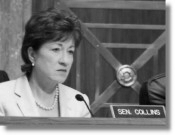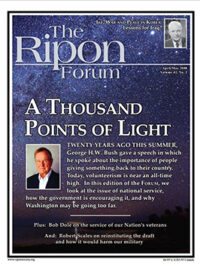Terrorists have inflicted painful wounds on the American people and have done severe damage to our economy. They could wreak even more terrible and far-reaching damage, however, if they detonated a nuclear weapon in an American city.
The grim estimate of experts is that a noontime detonation in Manhattan’s Times Square of a 10-kiloton device – about two-thirds the size of the bomb that devastated Hiroshima in 1945 – would instantly extinguish half a million lives and damage all buildings within a half-mile radius. Hundreds of thousands of burn victims would need urgent care; people in contact with radioactive dust and debris would need decontamination. Devastating economic and psychological impacts would surely follow.
 Al Qaeda and other terrorist groups have spoken openly of their intentions to mount spectacular attacks on Americans, and we know that they seek weapons of mass destruction.
Al Qaeda and other terrorist groups have spoken openly of their intentions to mount spectacular attacks on Americans, and we know that they seek weapons of mass destruction.
To be sure, our terrorist enemies have other weapons at their disposal. Improvised explosive devices have killed thousands and continue to threaten our troops and civilians throughout the world. Chemical weapons, such as Sarin gas, have been directed against targets like the Tokyo subways. “Dirty bombs,” using readily available radiological waste, could have serious consequences.
Still, the concentrated force of a nuclear explosion, the radioactive contamination, and its psychological and economic impact place nuclear terrorism in a category all its own.
The threat is not new. More than 30 years ago, the Federal Office of Technology Assessment concluded that “a small group of people, none of whom have ever had access to the classified literature, could possibly design and build a crude nuclear explosive device.” That is, with a machine shop and less than 100 pounds of enriched uranium, terrorists conceivably could assemble an atomic bomb.
Even determined and resourceful terrorists face challenges in obtaining sufficient fissile material, assembling a bomb, transporting it, and successfully detonating it. They may, of course, try to buy or steal an existing weapon, which is why non-proliferation and nuclear security efforts are so important. And they would face a number of counter-measures such as the radiation monitors already installed at the 22 largest U.S. seaports.
Though the probability of a successful nuclear-terror attack may be low, such an operation is possible and would fulfill Al Qaeda’s goal of a “spectacular” attack. We cannot ignore this peril. As one expert stated, the threat of nuclear terrorism is urgent and compelling.
The terrorist nuclear threat places a premium on good intelligence, diplomacy, and technical counter-measures to secure nuclear weapons and fissile materials, prevent theft and black-market sales, detect radioactive shipments, penetrate terrorist networks, and otherwise discourage nuclear proliferation. Close interagency cooperation and information sharing with our allies is a critical part of our defense, as is cooperation with other governments and international organizations to help Russia and other nations to secure stockpiles of fissile materials.
We must plan also as effective a response as possible to a devastating nuclear attack on a U.S. city. The National Response Framework provides the foundation on which the Department of Homeland Security, including the Federal Emergency Management Agency, the Department of Defense, and other critical agencies coordinate their resources to deal with the catastrophic consequences of a nuclear attack.
Through the Probability of a successful nuclear-terror attack may be low, such an operation is possible and would fulfill Al Qaeda’s goal of a “spectacular” attack.
The U.S. Senate’s Committee on Homeland Security and Governmental Affairs has heard both public and classified testimony on the nuclear-terror threat and the challenges for response. The testimony depicted horrifying scenarios of death, injury, and destruction, and of massive challenges for responders. Medical personnel would be dealing with mass trauma casualties. At the same time, major medical facilities in the target city might be destroyed or overwhelmed. Many local first responders might be casualties themselves, while responders from outlying areas would have to cope with floods of refugees, blast debris, and fires – not to mention the daunting prospect of entering a blast zone contaminated with radioactive particles.
The enormous challenges facing emergency managers underscore the need to make our national framework for rapid and effective response to catastrophe as robust and ready as possible. Federal, state, and local governments, as well as non-profit organizations and private-sector entities with special expertise in logistics, must continue the improved cooperation and coordination that we have put in place since the Hurricane Katrina disaster of 2005.
The government’s plain duty to the American people is to exert all possible efforts to detect and disrupt plans for a nuclear terror strike – and to have plans in place if prevention fails.
Susan M. Collins serves in the United States Senate from the State of Maine. She is the Ranking Member and former chairman of the Senate Committee on Homeland Security and Governmental Affairs.




